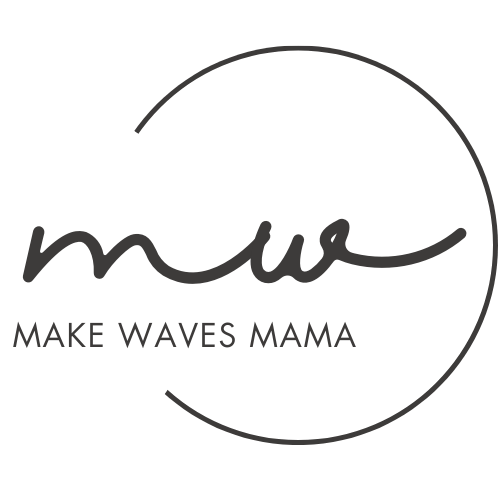When You See the Burnout Coming But Can't Stop It
Oct 01, 2025
Last Thursday night, I came home from four days away and yelled at my kids over a wreath.
Not because of the wreath. Because I was running on empty, and they were the first people in my path.
If you've ever snapped at someone you love over something small, if you've ever had a plan to take care of yourself that completely fell apart, or if you've ever watched yourself crash even though you saw it coming — this one's for you.
The Week I Saw Coming
Climate Week NYC is my busiest week of the year. This year, I stayed in the city Monday through Thursday — back-to-back meetings, panels, speaking engagements, and the kind of schedule that runs on adrenaline and cold brew.
Here's the thing: I knew it would be brutal.
I'd even posted about it on Instagram earlier that week — acknowledging the intensity, naming that I had a plan to manage it, being transparent about the challenge ahead.
I wasn't blindsided. I had awareness. I had strategies. I had intentions. And I still crashed.
The Wreath Incident
Thursday night, I finally walked through the door. I hadn't seen my kids since Sunday.
They were fighting. Loudly. Over who got to change our front door wreath from summer to fall. Normally, I'd either find it sweet or at least manageable.
Instead, I snapped. Not a gentle redirect. A full, sharp-edged snap. The kind that comes from a nervous system running on fumes.
And here's what made it gut-wrenching: This wasn't about the wreath. This was about me walking in completely depleted, with nothing left to give the people I'd been missing for four days.
My daughter's face told me everything. That look of confusion mixed with hurt — why is Mom so mad about this?
I'd wasted our reunion moment. I'd been gone for days, and instead of presence, I brought my depletion into the room and made it their problem.
But I Saw This Coming
So what happened? If I knew Climate Week would be intense, if I had a plan, why did I still end up snapping at my kids over a wreath?
Because some weeks are uncontrollable.
Because even with the best self-awareness and the best intentions, life doesn't always cooperate. Because knowing what you need and actually being able to do it are two very different things.
This is the gap nobody talks about in wellness culture. We're told: know your limits, read your body's signals, practice self-care. And all of that is true and important.
But what about the weeks when you do know your limits and you still have to exceed them? What about when you read the signals loud and clear, but there's no exit ramp?
The Signals I Saw (But Couldn't Always Act On)
My body was loud all week:
- Monday: wide awake at 3am, mind racing (knew I needed sleep, had speaking engagements ahead)
- Tuesday: headache all day, no matter what I did (even when I was moderating a panel)
- Wednesday: my patience was paper-thin (recognized it, still had back-to-back commitments)
- Thursday: cried on my way to the train home (when I could finally let go, the lethargy hit hard)
This is the part they don't tell you about self-care: Sometimes you can read all the signals and still not be able to change course. Not because you're failing at self-care. But because some weeks simply demand more than you have to give.
How to Tell the Difference: Early Warnings vs. Emergency Signals
One of the biggest things I'm learning is this: your body whispers before it shouts.
Even in uncontrollable weeks, there's a difference between early warnings and emergency signals. And knowing the difference helps you make smarter choices about where you can and can't push.
Early Warning Signals (You're depleted but still functional)
- Physical tension you notice during the day (tight shoulders, clenched jaw, shallow breathing)
- Feeling "wired and tired" — exhausted but can't settle
- Shorter fuse than usual, but you can still catch yourself before you snap
- Sleep disruptions (trouble falling asleep, waking in the night)
- Small tasks feel harder than they should
What this means: You're running low on reserves, but you're not empty yet. You can still make it through if you absolutely have to — but you need to find micro-moments of recovery wherever possible.
What to do: You might not be able to cancel the week, but you can look for tiny pressure valves. Skip one non-essential meeting. Take 10 minutes outside between events. Go to bed 30 minutes earlier. Say no to the after-event drinks. Ask for help with one thing at home.
Emergency Signals (Your body is taking over)
- Snapping at people you love over minor things
- Physical symptoms you can't ignore (migraines, stomach issues, getting sick)
- Feeling numb or disconnected from yourself
- Can't remember the last time you felt present
- Crying or rage that feels disproportionate to the trigger
- Making mistakes you wouldn't normally make
What this means: You're past depletion. You're in damage control mode. Your nervous system is in full emergency response.
What to do: This is not the time to "power through the weekend and bounce back Monday." You need real recovery. Cancel what you can. Ask for help. Sleep. Let things be imperfect. Accept that repair will be needed.
By Thursday night, I was solidly in emergency territory. The wreath moment told me that.
What to Do When You Can't Prevent the Crash
Here's what I'm learning about the weeks you can't control:
1. Acknowledge what's actually in your control, and what isn't
During Climate Week, I couldn't control:
- Being away from home for four days
- The intensity of the schedule
- The team dynamics that come with a stressful week
But I could have controlled:
- Whether I stayed up late emailing or went to bed
- Whether I drank that 3pm espresso or opted for water instead
- Whether I did that morning workout or pressed snooze for another hour
Sometimes the big things are non-negotiable. But there are usually small things at the margins that we do have power over — we just have to be honest about which is which.
2. Find micro-moments of recovery
When you can't take a day off or cancel obligations, recovery has to happen in tiny pockets:
- 5 minutes outside between meetings
- A real lunch break instead of eating snacks on hand
- One extra hour of sleep
- A 2-minute breathing exercise in the bathroom
- Asking someone to handle one thing so you don't have to
These won't prevent burnout during an extreme week. But they can be the difference between depleted and completely empty.
3. Lower the bar everywhere else
During an uncontrollable week, something has to give. For me, that should have been:
- Not trying to keep up with texts and emails outside of work
- Giving myself permission to be "off" when I got home instead of expecting myself to jump right back into family life
- Not feeling guilty about my very willing partner carrying the load at home, even while battling a lingering cold —and not letting my anxiety spiral, even though any illness, however ordinary, is harder when you're loving a two-time cancer survivor
I tried to let things go, but didn't fully release the expectation that I should be doing more. That's the work.
4. Plan for repair, not perfection
You're going to snap. You're going to zone out during a conversation. You're going to miss moments. The question isn't whether you'll mess up; it's how you'll repair when you do.
For me, repair looked like apologizing to my kids before bed on Thursday. Getting down to their level and saying: "I was away and really tired, and I reacted badly. That wasn't about you or the wreath. I'm sorry."
It wasn't the reunion I'd imagined. But repair counts. And modeling repair — showing them that adults make mistakes and can own them — matters too.
The Lie We Tell Ourselves
"I'll rest after this week."
I told myself that all week. Monday, Tuesday, Wednesday, Thursday — just get through this, and then you can recover.
But here's the truth: If you don't build in any recovery during the hard week, you won't just be tired at the end. You'll be destroyed. And the people you love will absorb the impact.
Rest isn't a luxury you earn after proving yourself. Rest — even in tiny, imperfect doses — is what keeps you from becoming someone you don't recognize in the moments that matter most.
The Questions I'm Asking Myself Now (And You Can Too)
This week, I'm sitting with different questions. Maybe they'll help you too:
- What's actually in my control this week — and what isn't? Be honest. Stop trying to control the uncontrollable, and focus your energy on the margins where you do have power.
- Where can I find 5 minutes of recovery today? You don't need a spa day. You need five minutes of not being "on." Where can you find that?
- What can I let drop to a "good enough" standard right now? You can't do everything at 100% during a hard week. What can you do at 60% and be okay with it?
- Am I pushing because it genuinely serves me, or because I'm scared to stop? Sometimes pushing is the right choice. Sometimes it's just momentum and fear. Which is it?
- If I do crash, how will I repair? Don't wait until you've hurt someone to think about this. Have a plan for how you'll come back when you mess up.
The Bottom Line
Some weeks, you see the burnout coming and you still can't stop it. Not because you failed at self-care. Not because you didn't know better. But because life is messy and sometimes uncontrollable, and knowing what you need doesn't always mean you can access it.
What matters is what you do in the tiny spaces you do control. The five-minute breaks. The thing you say no to. The repair after you snap. The honesty about what's too much.
I learned that the hard way. Over a wreath. On a Thursday night. When my kids deserved better, and I had nothing left to give.
I'm still learning. Still catching the signals. Still sometimes choosing (or being forced) to push when I know I shouldn't. But I'm getting better at the repair. And that counts.
What about you? What's one thing that's genuinely not in your control right now — and one small thing that is?
Sometimes just naming the difference out loud helps us see where we actually have power.
Stay connected
Sign-up for a mix of honest insights, tips, and stories delivered to you each week via Your Weekly Boost.
We hate SPAM. We will never sell your information, for any reason.

